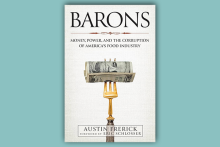corporate abuse

FARMER AND WRITER Wendell Berry has reminded us for decades that eating is an agricultural act, a daily, sacred practice that connects us to the land and people who produce our food. But given the story Austin Frerick tells in Barons: Money, Power, and the Corruption of America’s Food Industry, it’s fair to say eating is now an industrial act.
Frerick, an expert on agricultural and antitrust policy, grew up helping his grandparents farm near Cedar Rapids, Iowa. He watched dramatic changes in the state’s landscape over time: Corn and soybeans replaced diverse crops. Pigs and cows disappeared. Family farms and the local businesses that supported them faded away, replaced by industrial-scale farms.
Frerick looked for answers and found a handful of tycoons driving these changes across the U.S. He profiles seven of them, showing how their corporate monopolies have transformed every aspect of our food system.
Jeff and Deb Hansen are the hog barons. The Iowa couple has built an empire of hog confinement facilities, warehouses in which thousands of hogs are packed until ready for slaughter. It’s more profitable for meatpackers to buy these hogs than those from family farms, which has put thousands of small farmers out of business. Frerick writes that since the Hansens started their company in 1992, “the state’s pig population has increased by more than 50 percent while the number of hog farms has declined by over 80 percent.”

2016 TURNED OUT to be the year that the American people woke up and realized that most of them hadn’t had a real pay raise in more than 40 years while the oligarchs in our top 1 percent had been making out like bandits. As a result, millions of our fellow Americans voted for a democratic socialist presidential candidate. But, as you may have noticed, even more just got really mad, then went to the polls and did something really crazy.
Sadly enough, we all could have avoided many of our current problems if we had just been reading In These Times magazine for the past 40 years.
That’s the takeaway from the recent book The Age of Inequality: Corporate America’s War on Working People, a Forty-Year Investigation by In These Times, edited by ITT contributing editor Jeremy Gantz. The book compiles chronologically arranged excerpts from the Chicago-based publication’s coverage of labor and the economy from its 1976 launch through the dawn of the Trump era. The result is a sweeping chronicle of the slow-motion coup by which the billionaire class seized all the levers of power in our erstwhile democracy and used them to siphon wealth upward from ordinary workers to the corporate elite.

It's a clear sign something's wrong when talks on "free trade" turn an island paradise into an armed camp.
Hawaii is on lockdown this week while the U.S. tries to hammer out a regional trade agreement that's being called "NAFTA for the Pacific." While some mean this as a compliment, Hawaii's faith and labor leaders are lifting their voices against an agreement they believe will put profits for banks and corporations above workers' rights, indigenous culture, and local communities. Those leaders are drawing on the Pacific region's indigenous "Coconut Theology" to provide an alternative vision of the common good.
"Coconut Theology came out of our contextual understanding of the Gospel in the Pacific," said Rev. Piula Alailima, pastor of Wesley Methodist Church in Honolulu and a core leader in the community organizing group Faith Action for Community Equity (FACE). "When we break the body of the coconut and partake of the juice, it's a symbol of the body and blood of Christ, of sacrifice, of community and the common good."